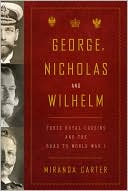The Last Days of the Romanovs: Tragedy at Ekaterinburg
The brutal murder of the Russian Imperial family on the night of July 16–17, 1918 has long been a defining moment in world history. This book gives a riveting day-by-day account of the last fourteen days of their lives, as the conspiracy to kill them unfolded.\ In the vivid style of a TV documentary, Helen Rappaport reveals both the atmosphere inside the family’s claustrophobic prison and the political maneuverings of those who wished to save—or destroy—them. With the watching world and...
Search in google:
On the sweltering summer night of July 16, 1918, in the Siberian city of Ekaterinburg, a group of assassins led an unsuspecting Tsar Nicholas II of Russia, his wife, the Tsarina Alexandra, the desperately ill Tsarevich, and their four beautiful daughters, Olga, Tatiana, Maria, and Anastasia, into a basement room where they were shot and then bayoneted to death.This is the story of those murders, which ended three hundred years of Romanov rule and set their stamp on an era of state-orchestrated terror and brutal repression.The Last Days of the Romanovs counts down to the last, tense hours of the family’s lives, stripping away the over-romanticized versions of previous accounts. The story focuses on the family inside the Ipatiev House, capturing the oppressive atmosphere and the dynamics of a group—the Romanovs, their servants, and guards—thrown together by extraordinary events. Marshaling overlooked evidence from key witnesses such as the British consul to Ekaterinburg, Sir Thomas Preston, American and British travelers in Siberia, and the now-forgotten American journalist Herman Bernstein, Helen Rappaport gives a brilliant account of the political forces swirling through the remote Urals town. She conveys the tension of the watching world: the Kaiser of Germany and George V, King of England—both, like Alexandra, grandchildren of Queen Victoria—their nations locked in combat as the First World War drew to its bitter end. And she draws on recent releases from the Russian archives to challenge the view that the deaths were a unilateral act by a maverick group of the Ekaterinburg Bolsheviks, identifying a chain of command that stretches directly, she believes, to Moscow—and to Lenin himself.Telling the story in a compellingly new and dramatic way, The Last Days of the Romanovs brings those final tragic days vividly alive against the backdrop of Russia in turmoil, on the brink of a devastating civil war. Publishers Weekly Synthesizing a variety of sources, British historian Rappaport (Joseph Stalin) details the Romanovs' last two weeks, imprisoned in a cramped private house in Ekaterinburg, a violently anti-czarist industrial city in the Ural Mountains where Nicholas II; his wife, Alexandra; and their five children were executed on July 17, 1918. The czar's rescue was a low priority for the Allies, and several escape plots by Russian monarchists came to naught. A lax guard was replaced by a rigorous new regime on July 4, headed by Yakov Yurovsky, whose family's impoverished Siberian exile had fueled his burning hatred for the imperial family, and his ruthless assistant and surrogate son, Grigory Nikulin. How the last czar and his family died was one of Russia's best-kept secrets for decades, and Rappaport spares none of the gory details of the panicked bloodbath (it took an entire clip of bullets to finish off the czarevitch because an undergarment sewn with jewels protected the boy's torso) and botched burial of the corpses. Although parts of the Romanov saga are familiar and Rappaport's sympathy for the czar often seems naïve, this is an absorbing, lucid and authoritative work. 16 pages of photos. (Feb. 3)Copyright © Reed Business Information, a division of Reed Elsevier Inc. All rights reserved.
List of IllustrationsIntroduction: The Red Urals 11 Behind the Palisade 112 'The Dark Gentleman' 283 The Man with a Cigarette 444 The Woman in a Wheelchair 585 Girls in White Dresses 736 The Boy in the Sailor Suit 867 The Good Doctor 988 'Our Poor Russia' 1069 'Everything Is the Same' 11810 'What Is To Be Done with Nicholas?' 12811 'Absolutely No News from Outside' 14412 'Something Has Happened to Them in There' 15913 'Ordinary People Like Us' 17014 The House of Special Purpose 17515 'The Will of the Revolution' 18416 'The World Will Never Know What We Did to Them' 203Epilogue: The Scent of Lilies 208Note on Sources 224Bibliography 228Index 243
\ From the PublisherPraise for The Last Days of the Romanovs\ “The brutal 1918 massacre of the Romanov family may be familiar, but in Russian scholar Rappaport's hands, the tale becomes as shocking and immediate as a thriller. Drawing on new archives and forensics, she crafts a portrait of the final weeks of Russia's last imperial family, cramped in the House of Special Purpose in Ekaterinburg. Though Tsar Nicholas's rule was harsh, the love and religious devotion he and his family shared makes them sympathetic. The Romanovs are now saints in Russian Orthodoxy, symbols of faith and hope. This gripping read helps you understand why.”—People magazine (3 ½ stars)\ “Synthesizing a variety of sources, Rappaport details the Romanovs’ last two weeks. . . . How the last czar and his family died was one of Russia’s best-kept secrets for decades, and Rappaport spares none of the gory details of the panicked bloodbath . . . and botched burial of the corpses . . . this is an absorbing, lucid and authoritative work.” —Publishers Weekly\ “British historian Rappaport combines detailed scholarship with an engaging narrative style. . . . The book's most gripping sections describe the days and hours leading up to and including the family's execution. Rappaport spares few details . . . Solid political and social history, related with the vigor of a true-crime thriller.” —Kirkus Reviews\ “Rappaport fills out her story with vivid detail and superb characterization, building the tension and drama to its brutal climax, sparing no stomach-turning details. She draws us in so well, that we very nearly smell the dusty drapes and taste the sweat hanging thick in the air of that tragic Siberian summer. We can’t stop reading, wondering what will happen next, even though we know full well what happens next. Meticulously researched and intimately drawn, this is a must read for anyone interested in the sad fate of the Romanovs, or for anyone interested in plumbing the depths of human depravity, witnessing the nobility of calm resignation, or reliving the tragedy that foretold the executions of hundreds of thousands of innocents in the decades to come.”—Russian Life\ “The Last Days of the Romanovs was, quite simply, stunning. It dealt with a subject that has long fascinated me, and I can say without reservation that it is the most detailed, authentic and gripping account of the bloody end of the Romanovs that I have ever read. I was staggered at how Helen Rappaport reconstructed and evoked such searingly vivid images; they are still with me now. Chilling and poignant, this is how history books should be written.” —Alison Weir, author of Henry VIII: The King and His Court\ “The Last Days of the Romanovs is perhaps the most accurate depiction of the demise of Nicholas and Alexandra that I've read. Beautifully researched and written, Helen Rappaport’s newest book is notable not only for its balanced view of Russia’s last imperial family, but its realistic portrayal of a close-knit family in distress.” —Robert Alexander, bestselling author of The Romanov Bride\ “That perfect but rare blend of history, sense of place, human tragedy, drama and atmosphere. . . . [The Last Days of the Romanovs] kept me up for 2 nights. . . . This book is going to be a bestseller . . . it will be the best read you will have had for ages.” —Susan Hill, author of The Various Haunts of Men and The Pure in Heart\ “Helen Rappaport has brought her subjects back to life with a sombre intensity. . . . The book is essentially a compassionate account of a close-knit, deeply devout and surprisingly ordinary family caught up in quite extraordinary circumstances. The atmosphere of dark menace that permeated the House of Special Purpose is very well captured as their Bolshevik captors gradually closed down their links with the outside world; sealing and whitewashing the windows and erecting a second perimeter fence. . . . I found this book a deeply touching anniversary tribute.” —The Independent (UK)\ “A highly accessible account . . . rather than romanticizing the family members, the author explores their numerous character defects. Set against the rich political backdrop of the bloody birth of the revolution, the result is extraordinary and powerful.” —Oxford Times (UK)\ “The Last Days of the Romanovs is well researched and has some excellent photographs . . . Rappaport successfully evokes the claustrophobic atmosphere within the house. . . . Nor does she spare the gruesome details of the massacre.” —Daily Telegraph (UK)\ “An unromanticised telling of the family’s incarceration in the Ipatiev house and the circus that went on around them. [The Last Days of the Romanovs] brilliantly shows how history is never simple but always enthralling when written with this style.” —Bookseller (UK)\ “An effective and engaging synthesis . . . with skill and imagination [Rappaport] juxtaposes the escalating chaos outside with the day-to-day tedium of the prisoners. . . . The result is an intriguing personal angle on what had seemed an exhausted subject.”—Sunday Times (UK)\ “[Helen Rappaport] skilfully weaves together the grimly repetitive routine of the doomed family with the high drama engulfing the killers as they add the finishing touches to their terrible plan. Though some of the material is familiar, Rappaport's countdown format makes The Last Days of the Romanovs freshly compelling.” —New Statesman (UK)\ “As a short work of history it is informative and concise, telling you everything you need to know to understand what went on. As a fresh look at a crucial point in Russian and world history it presents new evidence and some fascinating first-hand accounts. As a family drama - parents alongside their children unaware of their deadly fate - it is claustrophobic and gripping. I cannot recall the last time I enjoyed a history book as much as this.”—Scott Pack, Me and My Big Mouth blog author (UK)\ \ \ \ \ \ Publishers WeeklySynthesizing a variety of sources, British historian Rappaport (Joseph Stalin) details the Romanovs' last two weeks, imprisoned in a cramped private house in Ekaterinburg, a violently anti-czarist industrial city in the Ural Mountains where Nicholas II; his wife, Alexandra; and their five children were executed on July 17, 1918. The czar's rescue was a low priority for the Allies, and several escape plots by Russian monarchists came to naught. A lax guard was replaced by a rigorous new regime on July 4, headed by Yakov Yurovsky, whose family's impoverished Siberian exile had fueled his burning hatred for the imperial family, and his ruthless assistant and surrogate son, Grigory Nikulin. How the last czar and his family died was one of Russia's best-kept secrets for decades, and Rappaport spares none of the gory details of the panicked bloodbath (it took an entire clip of bullets to finish off the czarevitch because an undergarment sewn with jewels protected the boy's torso) and botched burial of the corpses. Although parts of the Romanov saga are familiar and Rappaport's sympathy for the czar often seems naïve, this is an absorbing, lucid and authoritative work. 16 pages of photos. (Feb. 3)\ Copyright © Reed Business Information, a division of Reed Elsevier Inc. All rights reserved.\ \ \ Library JournalUsing a wide range of primary sources in English and Russian, Rappaport (Queen Victoria: A Biographical Companion), a British author who specializes in Russian studies, concentrates on the final weeks of the Romanov family's house arrest before their execution in Ekaterinburg in July 1918. Weaving in political and historical context, the author deftly conveys the tense and claustrophobic atmosphere in the "House of Special Purpose," as the family's place of detention was euphemistically called. The most engaging sections of the narrative are those that delve into the personalities of the family, showing them as flawed but sympathetic. The author details how their utter devotion to one another, their country, and their religion sustained them in their final days and contrasts their state of resigned calm with their jailers' merciless plans to "liquidate" the family. An epilog touches on the canonization of the family as saints in Russian Orthodoxy and their enduring mystique. Poignant but never maudlin, this book is an absorbing read, though the more serious reader might wish for more detailed notes on sources. Recommended for academic and large public libraries. (Illustrations not seen.)\ —Megan Hahn Fraser\ \ \ \ \ \ Kirkus ReviewsYou-are-there account of the grim 1918 countdown toward the deaths of Tsar Nicholas II and his family. British historian Rappaport (No Place for Ladies: The Untold Story of Women in the Crimean War, 2007, etc.) combines detailed scholarship with an engaging narrative style. She lays the groundwork by summarizing Nicholas' tumultuous reign and the list of grievances that Russia's new communist regime and many citizens had against him. Short mini-biographies of the royal couple, their four daughters and one son make the point that isolation from their subjects caused resentment to build and made the leaders of the Bolshevik government intent on swift, brutal justice. Rappaport doesn't break much new ground in her descriptions of the cramped conditions and onerous restrictions that defined the Romanovs' lives under heavy guard from April 30 to July 17, 1918, in the Siberian city of Ekaterinburg. She does, however, strongly convey how far they had fallen and how difficult living in such close quarters was, especially for the Tsaritsa Alexandra and her son, Tsarevich Alexey, who were both quite ill. Rappaport's research uncovered some previously unknown efforts by British and German monarchs to rescue the Romanovs and provide them with safe haven. These efforts were stymied by "flabbiness of will," in addition to internal and external political obstacles, she concludes. The book's most gripping sections describe the days and hours leading up to and including the family's execution. Rappaport spares few details; indeed, some unduly lengthy recitals of meals and similar trivialities could have been omitted. There's no flab, however, in her grisly evocation of the scene after theexecution: "The corpses, many of them with hideous, gaping head wounds and broken and dislocated limbs, were now horribly mangled and ugly, their hair matted with caked blood. It was almost impossible to associate these wretched twisted bodies with the five charming, vibrant children of the official publicity."Solid political and social history, related with the vigor of a true-crime thriller. Agent: Charlie Viney/Mulcahy & Viney\ \







